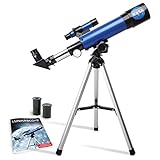 Advertising Disclosure
Advertising DisclosureTelescopes Comparison - February 2026

Our Top 3 Picks
Here are the top 3 recommended products with more information to help you find the right product for you9.7
1Celestron12% OffCelestron NexStar 8SE Computerized Telescope – 8-Inch Schmidt-Cassegrain Optical Tube – Fully Automated GoTo Mount with SkyAlign – Ideal for Beginners and Advanced Users – 40,000+ Object Database
9.1 materials Quality8.4 Simple to use8.4 movabilityWhy we love it
Celestrons iconic orange tube telescope
8 inch aperture for great light gathering ability
Fully automated go to mount for easy use
9.4
2CelestronCelestron NexStar 8SE Computerized Telescope – 8-Inch Schmidt-Cassegrain Optical Tube – Fully Automated GoTo Mount with SkyAlign – Ideal for Beginners and Advanced Users – 40,000+ Object Database
9.1 materials Quality8.4 Simple to use8.4 movabilityWhy we love it
Celestrons iconic orange tube telescope
8 inch aperture for great light gathering ability
Fully automated go to mount for easy use
9.2
3Gskyer49% OffGskyer Telescope, 70mm Aperture 400mm AZ Mount Astronomical Refracting Telescope for Kids Beginners - Travel Telescope with Carry Bag, Phone Adapter and Wireless Remote.
9.9 Giftable9.8 movability9.8 materials QualityWhy we love it
400mm f/5.7 focal length
70mm aperture
Fully coated optics glass lens

Telescopes Buyer's Guide
 Written by Jim Williams
Written by Jim WilliamsIntro to Telescopes
Telescopes are powerful tools of exploration, allowing us to view distant stars, planets and galaxies. Whether you're a beginner or an experienced astronomer, having the right telescope can make a world of difference. Telescopes come in many shapes and sizes, with each type offering its own advantages and disadvantages. This guide will help you choose the telescope that best suits your needs.
Types of Telescopes
There are two main types of telescopes: refractors and reflectors. Refractors use a lens to gather and focus light, while reflectors use a combination of mirrors to gather and focus light. Refractors tend to be the more popular choice, as they are generally more compact and less expensive. Reflectors, on the other hand, have larger apertures and can provide a better view of distant objects. It is important to note that both types of telescopes require some assembly and maintenance.
Aperture and Magnification
When it comes to telescopes, the two most important features are the aperture and the magnification. The aperture is the diameter of the lens or mirror and is the most important factor in determining the clarity and detail of the image. The magnification is the amount that the image is enlarged and is typically measured in millimeters. The higher the aperture, the more light your telescope can gather and the more detail you will be able to see. The higher the magnification, the more you can zoom in to view distant objects.

Computerized Telescopes
Computerized telescopes are a great way to get the most out of your telescope. They use a computer to help you locate and track objects in the sky. They are usually more expensive than manual telescopes, but they can save you time and frustration when trying to find and observe objects. Some computerized telescopes have additional features such as the ability to take photos or video.
Mounts
Telescopes are usually mounted on a tripod or equatorial mount. Tripod mounts are the simplest and most common type of mount, while equatorial mounts allow you to track objects as the sky moves. If you plan to use your telescope for astrophotography, an equatorial mount is essential. The mount should be sturdy and well-balanced, as any movement or vibration can blur the image.
Accessories
The right accessories can make a big difference in your viewing experience. Eyepieces are a must-have for any telescope and come in a variety of shapes and sizes. Barlow lenses and filters can also help enhance your view. If you want to take photos or videos, you'll need a camera adapter and a DSLR camera.

Our ranking system
At bestchoice.com, our team curates a selection of top products from a vast array available online, using a sophisticated ranking system based on carefully defined criteria.While traditional hands-on testing has its merits, our use of AI technology offers distinct advantages. AI allows us to process and analyze vast amounts of data from multiple sources, providing a comprehensive view that goes beyond what manual testing can achieve. This approach enables us to deliver insights that are aligned with current trends and consumer preferences, ensuring our reviews are both relevant and up-to-date.
Features
Our AI-driven analysis examines key attributes, capabilities, and other critical factors tailored to each product category. This method allows us to assess effectiveness from various perspectives, ensuring a well-rounded evaluation.
Consumer Reviews
We aggregate and evaluate consumer feedback from across the internet, giving weight to ratings and reviews that reflect the most reliable insights. AI enhances this process by filtering and prioritizing data, offering a balanced view without the need for direct personal endorsements.
Popularity
Our system also considers the popularity of products, analyzing factors such as market presence, reputation, and user satisfaction. By leveraging AI, we capture a comprehensive picture of a product's standing in the market, which may not always be evident through traditional testing.
Value for money
AI allows us to compare products based on attributes like price, specifications, and user feedback, helping to determine their value for money. This data-driven approach offers an efficient and reliable way to assess how products stack up against one another in terms of cost-effectiveness.




























